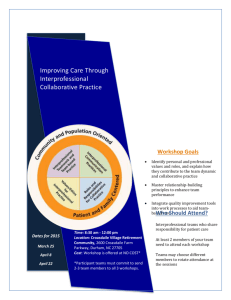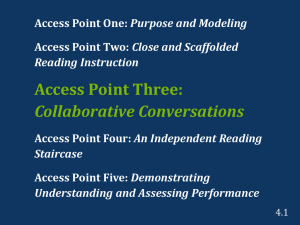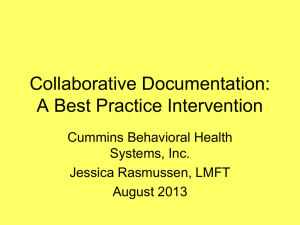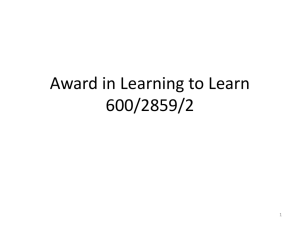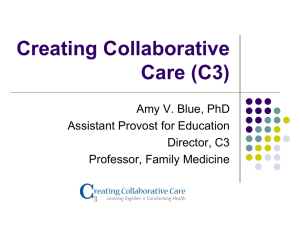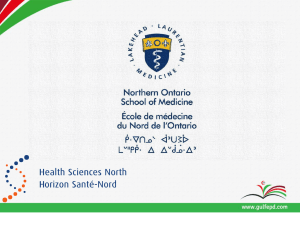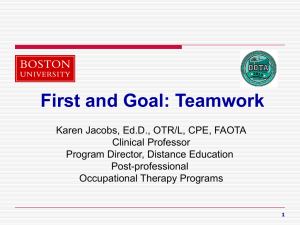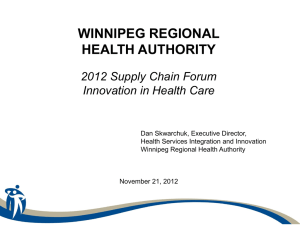Program Overview
advertisement
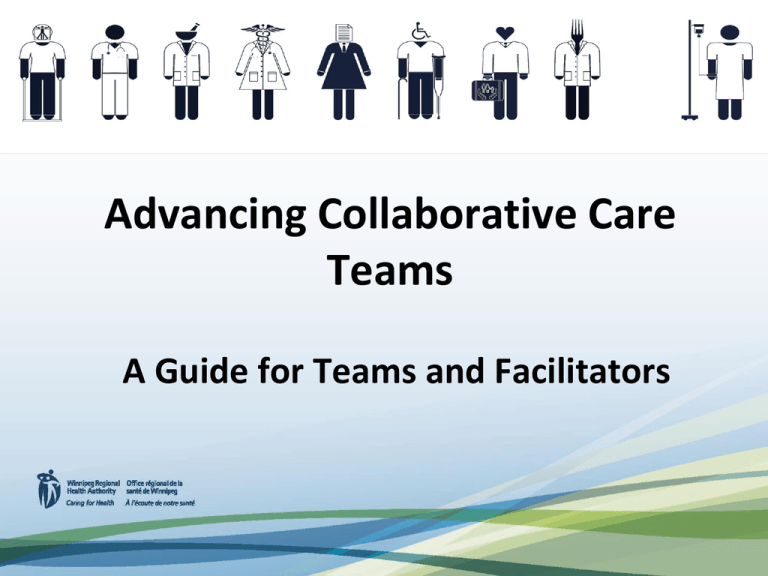
Add in Pictogram (Character Line) Advancing Collaborative Care Teams A Guide for Teams and Facilitators Presentation Objectives • To define collaborative care and its importance to patient outcomes and team effectiveness • To discuss the core competencies/indicators of high performing collaborative care teams • To frame this work within the current WRHA context • To describe the “Advancing Collaborative Care Teams” Program Defining Collaborative Care • Collaborative Care in healthcare occurs when multiple health providers from different professions provide comprehensive services by working with people, their families, care providers and communities to deliver the highest quality of care across settings Curran V, Sargeant J, Hollett A. Evaluation of an interprofessional continuing professional development initiative in primary health care. J Contin Educ Health Prof 2007 Fall;27(4):241-252. Terminology Interprofessional vs Multi Disciplinary Why Collaborative Care? Evidence continues to emerge that links Collaborative Care to: • Improved quality, safety, and outcomes of care • Higher client, family and provider satisfaction • Enhanced system efficiency and effectiveness Curran V, Sargeant J, Hollett A. Evaluation of an interprofessional continuing professional development initiative in primary health care. J Contin Educ Health Prof 2007 Fall;27(4):241-252. Ovretveit J. Does clinical coordination improve quality and save money? The Health Foundation June 2011. Reeves S, Goldman J, Sawatzky-Girling B, Burton A. CIHC Library: Knowledge transfer & exchange in interprofessional education: Synthesizing the evidence to foster evidence-based decision-making. Available at: http://www.cihc.ca/library/handle/10296/326?mode=full&submit_simple=Show+full+item+record. Accessed 5/17/2012, 2012. WRHA Key Accomplishments • Regional guiding principles and shared definitions • Embedding IPE and collaborative care into the WRHA strategic priorities • Strong partnerships with the University of Manitoba health sciences faculties • Adoption of the Canadian Interprofessional Health Collaborative (CIHC) National Interprofessional Competency Framework WRHA Key Accomplishments • Inclusion of interprofessional practice competency statements in regional job descriptions • Regional EHPCC (Educating Health Professionals in Collaborative Care) training • Online resource toolkit (www.wrha.mb.ca/collaborate) But what is missing…. With growing emphasis within the WRHA on the need to enhance team effectiveness, a standardized, evidence informed program aimed at improving and evaluating interprofessional collaborative care team performance is required. This program must be agile enough to apply to different types of teams practicing in diverse settings across the care continuum. EXTRA PROGRAM Executive Training for Research Application Creating a culture of evidence use by healthcare leaders Kathleen Klaasen Paul Komenda Susan Bowman EXTRA PROGRAM Applying Research in Solving the Problem: Expert Opinion 1. Stakeholder Consultation 2. Scoping Literature Review 3. Region Wide Survey 4. Focus Groups Systematic Review Market Research Qualitative Research Eight Indicators of Effective, High Performing Teams Indicators: 1. The team has identified a standardized way to measure team performance. Team performance indicators are monitored regularly and guide team decision making. 2. Care is organized based on the goals of patients (as opposed to the needs of health care providers). Indicators: 3. Team members have dedicated time for team development activities. 4. There is shared space in the environment for teams to work/socialize together. Indicators: 5. The team has a defined team role statement and team goals. 6. Processes are in place for interprofessional care planning (discharge rounds, care conferences, care rounds). Indicators: 7. Team composition and roles are defined by the needs of patients, scope of service, and the goal of optimizing scope of practice of health providers. 8. Standard operating procedures/clear role statements for all team members exist and minimize unnecessary duplication of service. Advancing Collaborative Care Teams Program Steps Determine Team/Organization Readiness Initial Meeting with Team Leadership Team Orientation Session Team Self-Assessment – 8 Indicators More Detailed Team Self-Assessment Team Observation/Documentation Review Balanced Score Card/Debriefing Develop Action Plan Follow- Up Sessions Pre Wk Wk Wk Wk Wk Wk Wk 1 2-3 4-5 6-7 8 20 32 Team & Organizational Readiness Initial Meeting with Team Leaders Defining the Team Team Orientation Team Self Assessment Team Observation Team De-brief Balanced Score Card Action Items Template Indicator Identified Area for Improvement Actions Required Targeted Completion Dates Assigned Team Members Progress/ Comments Follow-up Sessions Set regular “check-ins” with the team (e.g. 3 months, 6 months) to: • Review progress on the Collaborative Care Action Plan • Celebrate successes • Review and revise timelines, goals, priorities, etc. as required • Ensure continued focus on advancing collaborative care
